Ranking All 40 of Steven Moffat’s Doctor Who Stories – Part 3: #20 - #11
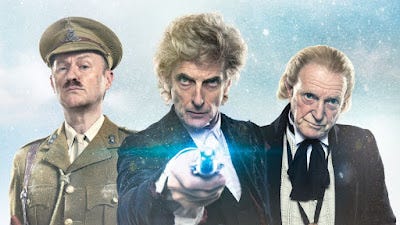
On April 3rd, 2010, a new era of Doctor Who began with “The Eleventh Hour,” and this week, that era came to an end with “Twice Upon a Time,” the Christmas Special that saw Steven Moffat, Peter Capaldi, and a whole host of other creatives from the era take a bow, handing the reigns off to Chris Chibnall and Jodie Whittaker for the show’s next, exciting step forward.
But with any change comes a chance for reflection, which is what I am doing here. Now that his final episode is out in the world, I am counting down all 40 – count ‘em, forty – Doctor Who stories Steven Moffat has contributed, as writer or, in a few rare cases, co-writer, from 2005’s “The Empty Child” to this week’s “Twice Upon a Time.” I watched every single one of these again, took extensive notes, and ranked them from least-favorite to most-favorite.
This series is also a walk down memory lane, as I have included links to my original written reviews and/or the original Weekly Stuff Podcast reviews to every episode. For “The Eleventh Hour,” which we reach today, I have even, in a rare little treat, gone back and found my original written review, which was either never published or published on a site that doesn’t still exist, and republished it on this blog under its original date for completion’s sake. Certainly a good window into my mind at the outset of this incredible journey.
This list will be published in four parts, once a day through the end of the week, with each part containing 10 episodes. I hope you enjoy, and if you would like to listen to these rankings in Podcast form, we did a whole episode for that.
Be sure to catch up with Part 1 and Part 2 if you haven’t already, and without further ado, let us continue with Part 3 - #20 - #11, coming up after the jump…
20. A Good Man Goes to War
Eleventh Doctor, Series 6; Directed by Peter Hoar
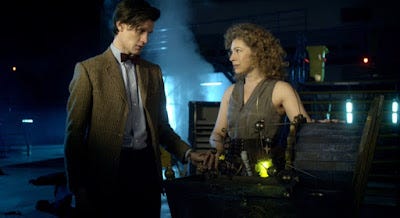
“You make them so afraid. When you began, all those years ago, sailing off to see the universe, did you ever think you’d become this? The man who can turn an army around at the mention of his name.”
Easily the best of Moffat’s Series 6 scripts, “A Good Man Goes to War” is also the most effective of Moffat’s ‘Doctor Who mythmaking’ stories, a trope he leaned on a lot in the Eleventh Doctor era but never expressed as fully or as elegantly as he did here. Part of that comes from the episode keeping Matt Smith off screen for so long, and then challenging the Doctor’s identity and actions so much in the episode’s final stretch. In an episode comprised almost entirely of great moments, many of them grand and operatic, my favorite one is its quietest, when the Doctor comforts a dying soldier named Lorna, who joined the army just to meet her favorite legend; only the Doctor doesn’t remember her, and the work Matt Smith does in illustrating a Doctor pretending to be the mythical hero this dying girl wants him to be is some truly powerful stuff. And it speaks to what the episode does so well, in funneling this big, climactic confrontation down to a personal reckoning, with the Doctor very definitively losing a battle, disappointing his friends, and being called on the darker side of his legacy by River Song (in what is easily one of Alex Kingston’s greatest and most effective moments as the character). In the Eleventh Doctor era, Moffat’s scripts, like the Doctor himself, could sometimes get too ‘big’ for their own good; but “A Good Man Goes to War” is a practically perfect marriage of the writer’s most thoughtful and bombastic qualities, the thematic rigor and the showmanship blending to powerful effect.
19. The Husbands of River Song
Twelfth Doctor, 2015 Christmas Special; Directed by Douglas Mackinnon
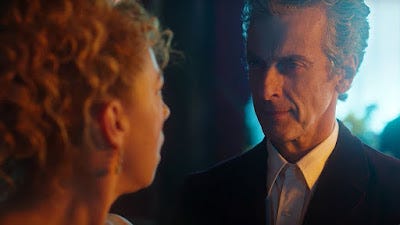
“When you love the Doctor, it’s like loving the stars themselves. You don’t expect a sunset to admire you back. And if I happen to find myself in danger, let me tell you, the Doctor is not stupid enough, or sentimental enough, and he is certainly not in love enough to find himself standing in it with me!”
“Hello sweetie.”
Peter Capaldi and Alex Kingston only had one episode together, and yet when I think back on River Song, I imagine her standing beside the Twelfth Doctor just as much as I do the Eleventh. This is due in no small part to Capaldi and Kingston’s sterling chemistry, nor can it be denied that having the Doctor’s physical appearance be closer in age to River makes it easier to buy into their romance (Capaldi and Kingston look like they could be a real-life married couple, whereas Matt Smith, for all his wonderful qualities, didn’t have that same kind of ‘gravity’ standing next to Alex Kingston). But this is also because “The Husbands of River Song” is, simply, a very good script, manic and wild in places – you can feel Moffat cutting loose with the silliness after the sheer emotional weight of Series 9, and it’s easily one of his funniest scripts – but with a tremendously strong heart that takes the central relationship between River and the Doctor more seriously than ever before.
Where Eleventh Doctor stories with River were big, fantastic, and operatic, “Husbands” is intimate, a story about two people who love each other deeply too afraid or vulnerable to admit so to the other. And when the moment comes where they finally do have to lay those cards on the table – I’ve quoted it above, and it’s one of my very favorite Twelfth Doctor moments – the emotional impact is vast, an impact that only snowballs over the last fifteen minutes as the Doctor prepares his and River’s final ‘date’ on Delirium. Romance is something Moffat largely (and wisely) elided during his time on Doctor Who, but the home stretch of “Husbands” embraces it beautifully, and the closing scene contains some of the best material Kingston or Capaldi ever got to play. And even as we know where River’s story will eventually take her, Moffat finds a clever, elegant way to give her and the Doctor something of a happy ending, a magic trick that makes the character’s entire winding arc seem more complete and impactful in retrospect.
18. The Pandorica Opens / The Big Bang
Eleventh Doctor, Series 5; Directed by Toby Haynes
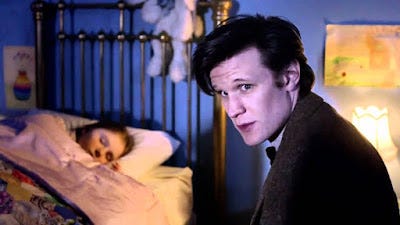
“Oh, that box. Amy, you’ll dream about that box. It’ll never leave you. Big and little at the same time, brand-new and ancient, and the bluest blue ever. And the times we had, eh? Would’ve had. Never had. In your dreams, they’ll still be there. The Doctor and Amy Pond…and the days that never came.”
In 2010, it had been pretty well established that Doctor Who finales stunk. Russell T Davies had many positive qualities as a writer and showrunner, but mounting an effective 2-part closing story that wasn’t buried under the weight of its own misplaced ambition wasn’t one of them. But as we progressed through the revelation that was Series 5, and saw how deftly and effectively Moffat and company laid out both the story and character arcs of the season, it felt more and more like the show might just be able to turn a corner when it came time for the finale – and lo and behold, it did. “The Pandorica Opens” and “The Big Bang” are big and rousing and ridiculous episodes in the ways we’d come to expect from prior finales, but with a much greater sense of focus, theme, and especially character, as the second hour in particular ties the season-long story of the old, raggedy Doctor and young Amy Pond together in emotionally impactful fashion. The closing stretch of “The Big Bang,” as the Doctor walks through his past as he prepares to be erased from history, is a stunner, featuring incredible work from a wise-beyond-his-years Matt Smith, and some of Moffat’s most wistful, evocative writing (the speech quoted above is an all-timer, plain and simple).
If I can make any knock against this story, it’s that the first hour does feel a bit wheel-spinning in places (some of the stuff in the Pandorica’s cavern, with the Cyberman corpse, goes on much longer than it needs to), and save for Matt Smith’s magnificent speech in Part 1, most of the memorable moments are concentrated in the second hour. But that’s not a bad problem to have overall, especially for what was the first modern Who finale to truly fire on all cylinders, to deliver on a season’s worth of mystery and character arcs in the most satisfying ways possible, and to affirm the value of these characters and performances in such joyous, satisfying fashion.
17. Twice Upon a Time
Twelfth & First Doctor, 2017 Christmas Special; Directed by Rachel Talalay
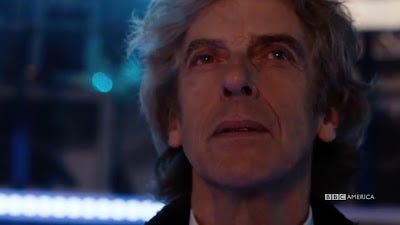
“Laugh hard. Run fast. Be kind. Doctor. I let you go.”
I’m writing this one on Christmas Day, just after seeing the episode, still wiping tears from my eyes after Peter Capaldi’s pitch-perfect final scene – all of which makes this the hardest episode for me to rank, because it’s still so fresh. I’m putting it one spot below Matt Smith’s final episode, but above everything else, and that feels right for now. Capaldi’s swan song was uniquely diffused across the two-part Series 10 finale (which you’ll hear about a bit higher up) and this one, “Twice Upon a Time,” which acts more as coda than its own bombastic finale.
But what a coda it is. Aggressively small-scale, “Twice Upon a Time” is a heartfelt consideration of legacy, time, and moving on. It’s a little messy in places, bursting at the seams with beautiful and witty dialogue, and deeply metatextual to the bitter end – and it’s exactly what Steven Moffat’s final episode probably always had to look like. Just as two Doctors grapple with their impending regeneration, this story is all about Moffat, Capaldi, and the viewers at home learning to embrace the change that awaits. Moffat will always have that meta streak inside of him, and I think he employs it beautifully here, with a story perfectly tailored to transition us out of his stewardship and into another’s, and one that, once again, shows just how deeply he understands the character of the Doctor. Both of them, in this case, as we not only get a wonderful final turn from Peter Capaldi, but a great performance from David Bradley as the First Doctor, paying tribute to William Hartnell while still making it his own. I love what Mark Gatiss, Pearl Mackie, and a few surprise guests bring to the table as well, and as a regeneration story should, it all culminates in a cascade of emotions that brings the tears flowing freely.
Capaldi’s stupendous final monologue is his era in microcosm – written with soaring emotive rhetoric by Moffat, directed with incredible panache and immediacy by Rachel Talalay, and performed to perfection by Capaldi himself. All three (along with composer Murray Gold, turning it what very much feels like his final score for the show, given how deeply it calls back to Modern Who’s earliest days) take the opportunity not only to say goodbye, but to beckon to the future – to give advice on what they’ve learned, to verbalize what they care most about, and in the end, to let go. That’s what Doctor Who is all about. It has been in the best of hands for almost a decade now – and I think everyone on screen would join in me in expressing the deepest excitement and anticipation for seeing what the new team shall do.
16. The Time of the Doctor
Eleventh Doctor, 2013 Christmas Special; Directed by Jamie Payne
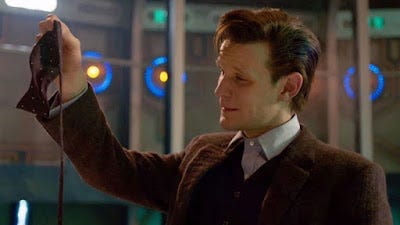
“I will not forget one line of this. Not one day. I swear. I will always remember when the Doctor was me.”
If “The Time of the Doctor” only had that pitch-perfect final scene quoted above going for it, that sad, beautiful, uplifting, expertly written, performed, scored, and shot regeneration sequence, it would still be a pretty good episode in its own right. The shot of Eleven’s bow-tie falling to the floor in slow-motion would, on its own, rank this episode pretty highly on my list. But “The Time of the Doctor” is so much more than just those final minutes, and it took me a few years and multiple viewings to fully wrap my head around what Moffat was going for here. It’s easy to cynically read this episode as a rushed attempt to wrap-up three seasons of dangling plot threads in one single hour, and to be sure, there are some moments of narrative clunkiness in wrapping up all the Eleventh Doctor’s adventures.
But Eleven was always a larger-than-life figure, a Doctor Moffat liked to surround in mythmaking and fairy-tale, and it seems fitting that his final adventure would not only be his grandest, but the one we in the audience see the least of. “Time of the Doctor” is essentially told through Clara’s eyes (and Jenna Coleman’s exquisite performance), meaning that when she is sent away from the Doctor, only to return to him centuries down his timespan, we don’t see anything from that gap either.
It is an utterly unique way to structure a Doctor’s final story; instead of one final adventure leading to a fatal blow, Eleven lives several lives in a single town over the course of this story, and many of the major threats and challenges he faced rippled into his past as a result of the story told here. It is, in retrospect, a truly elegant and creative way to cap Eleven’s excellent tenure, and most importantly, it gives Matt Smith room to deliver what is perhaps his finest work as the Doctor. Some wonky old-age makeup in the middle section aside, Smith gracefully glides through all the wild contours of this story, successfully making us believe, as he had from day one, that this visibly young man was many hundreds of years old underneath, wearing that age and wisdom on his sleeves in the most compelling ways. Perhaps the highest praise I can lend “The Time of the Doctor” is that as a tribute to a truly special performance, it positively soars.
15. The Magician’s Apprentice /
The Witch’s Familiar
Original Podcast Review – Part 1 / Part 2
Twelfth Doctor, Series 9; Directed by Hettie MacDonald
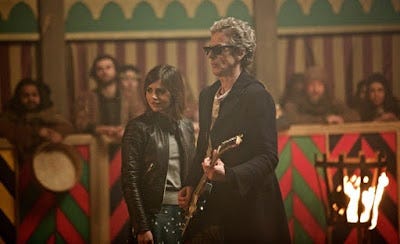
“I came because you’re sick and you asked. And because sometimes, on a good day, I’m not some Time Lord who ran away. I’m the Doctor.”
Opening the modern series’ best season off on spectacularly confident footing, this is one of those stories where Moffat’s writing is simply on fire, packing the story with so many incredible ideas – some wildly fun, others deeply dark and profound – throwing out great lines of dialogue like he has extras to spare, pushing each character to fascinating new places, and wrapping it all around a hugely compelling central theme: What if the Doctor, while wandering the universe, stumbled upon Davros as a child, and in failing to save the boy inadvertently created his greatest enemy? And what if an older, dying Davros remembers, and wants to confront the Doctor not through war, but through a dialogue? The centerpiece is truly the conversations between Peter Capaldi and Julian Bleach, an astounding series of scenes in which these two centuries-old enemies sit down and talk, and even reach a point of genuine empathy with one another.
It’s let down just a little bit by a climax too full of double-crosses, but it’s hard to hold that against the story when it is so bountiful with other riches. The expertly-calibrated use of Michelle Gomez’s Missy alone makes this the second-best Master story of the modern series, her antics perfectly walking the line between funny and horrifying, and culminating in one of the most dreadfully evil things the Master has ever attempted (trapping Clara inside a Dalek and almost convincing the Doctor to destroy it). But the episode belongs to Peter Capaldi, who makes his entrance riding a tank and shredding the electric guitar, and ends it by debuting the ‘Sonic Shades,’ a Doctor Who fashion accessory that belongs in the pantheon next to the scarf and the bowtie. In between, he gives us an absolute acting masterclass, taking the Doctor to places he had never been before – and for the incredible Series 9, this was only the tip of that particular iceberg.
14. Extremis
Twelfth Doctor, Series 10; Directed by Daniel Nettheim
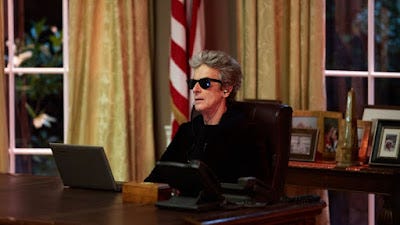
“It’s like Super Mario figuring out what’s going on, and removing himself from the game. Because he’s sick of dying.”
“Extremis” is one of three episodes from the Twelfth Doctor era (the others being “Listen” and “Heaven Sent”) where you can comfortably say Moffat is doing something Doctor Who has never attempted before, going out on experimental and surreal limbs the push the series to bold new places. “Extremis” is far and away the zaniest of these, combining the Doctor’s ongoing blindness, a book that compels anyone who reads it to commit suicide, a death cult party at CERN, and a nihilistic computer simulation into one of the most unsettling, disturbing, and endlessly engaging episodes of the modern era. The final sequence in the White House, with a dead President and a Doctor facing complete and utter defeat, is an all-timer, and the conclusion leaves one so shaken and disoriented that, much as I enjoy the ‘Monks Trilogy’ overall, one could argue this would be an even stronger story if it just stood on its own, unresolved, a glorious enigma of an hour. Layering the flashbacks to Missy’s aborted execution just enriches things even further, giving the Doctor one moral dilemma to reminisce on as he faces an existential crisis in the present, all of which foreshadows the character reckonings of the Series 10 finale.
13. The Zygon Inversion
(written with Peter Harness)
Twelfth Doctor, Series 9; Directed by Daniel Nettheim
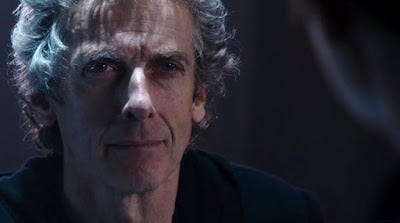
“I fought in a bigger war than you will ever know. I did worse things than you could ever imagine, and when I close my eyes… I hear more screams than anyone could ever be able to count. And do you know what you do with all that pain? Shall I tell you where you put it? You hold it tight! ‘Til it burns your hand. And you say this: No one will ever have to live like this. No one else will ever have to feel this pain. Not on my watch.”
Both as one half of a larger two-parter and as an episode for which Moffat is only a ‘co-writer,’ “The Zygon Inversion” is difficult to place on a list such as this. But the final twenty minutes – and the ten-minute span that encompasses the Doctor’s passionate, Socratic back-and-forth with the Zygon ‘Bonnie’ in particular – are so ludicrously good, so singularly well-written, so powerfully acted, and so riddled in Moffat’s distinctive fingerprints, that I don’t think any full accounting of Moffat’s Doctor Who tenure can be undertaken without them. It’s a great episode on the whole – so much so that Part 1, “The Zygon Invasion,” feels completely reverse-engineered from this hour – full of big, interesting ideas and featuring a great dual performance by Jenna Coleman. And the episode’s closing scene in the TARDIS provides one of my favorite Doctor/Clara exchanges. “Longest month of my life,” the Doctor says about the moment he presumed Clara dead. “Could only have been five minutes,” she says cheerfully. “I’ll be the judge of time,” he almost whispers, deadly serious.
But it’s that 10-minute speech/exchange that makes this hour an all-timer. In the abstract, it is such an audacious idea – a whole 2-part invasion story that boils down not to bombastic action, not to one of the Doctor’s clever tricks, but to a conversation on the philosophical underpinnings of war itself. In execution, it could not be realized any more powerfully, with Peter Capaldi giving one of the very best performances I have ever seen, in any medium. The sheer number of steps he has to walk us through, the shifts in tone and style and focus the speech winds across, is a challenge in and of itself, but it’s the way he makes this all seem like such a righteous, cathartic release for the Doctor is a wonder to behold. And the most powerful part might be completely nonverbal. When he finally has Bonnie starting to consider peace, he gives her this little smile of empathy, and the look on his face is simply unreal. It feels like no person should be able to emote that much just with their face, and it moves me to tears every time. In 20 years, this is going to be one of those sequences that Doctor Who fans rightfully regard as legendary, a major marker in the show’s history that will likely inspire writers and actors not just on this show, but on other shows in other genres. It is truly masterful, and that’s more than enough to give it a very high spot on this list.
12. The Time of Angels / Flesh and Stone
Eleventh Doctor, Series 5; Directed by Adam Smith
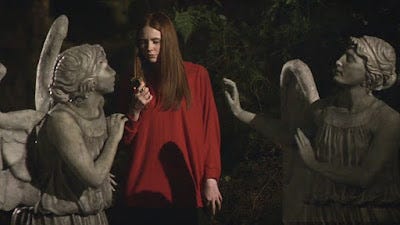
“A needle in a haystack.”
“A needle that looks like hay. A haylike needle of death. A haylike needle of death in a haystack of…statues. No, yours is fine.”
If “Blink,” the first Weeping Angels story, was ingeniously minimalist, then this two-parter, their second appearance, is almost gleefully maximalist, taking the basic threat of the Angels and exploding it out across a far wider action-adventure canvas. It is insane just how many creative, terrifying ideas Moffat packs into these two hours. It jumps breathlessly from scene to scene, each sequence upping the ante from the one before, always finding a new terror for the angels to enact upon the group: from living inside a recorded image, to inhabiting long-dead statues, to speaking through a deceased young soldier, to living inside Amy’s mind and forcing her to verbally count down to her own death against her will, to Amy having to move through an entire field of Angels while keeping her eyes shut. And if all that somehow wasn’t enough, the season’s central threat of the cracks in time show up in the second half to make the situation even more fraught. It is an absolute roller coaster of action and horror, and while there may be deeper episodes of Doctor Who than these ones, there are few as viscerally imaginative or exciting.
11. The Eleventh Hour
Eleventh Doctor, Series 5; Directed by Adam Smith
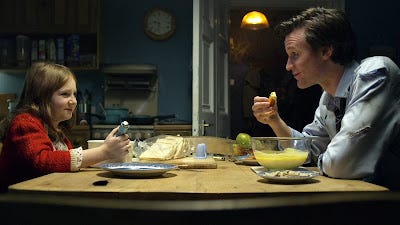
“Hello. I’m the Doctor. Basically, run.”
One of the very best Doctor introduction stories ever told, “The Eleventh Hour” started both the Matt Smith and Steven Moffat eras off on the most confident, energetic, and refreshing note possible. Reworking ideas seen in earlier scripts like “The Girl in the Fireplace,” Moffat introduces both the Eleventh Doctor and Karen Gillan’s Amy Pond in one breathless, beautiful story, and by episode’s end – heck, by the end of the ‘fish custard’ scene, before Gillan’s grown-up Amy has even appeared – both characters are so firmly, exquisitely established that one feels ready to follow them anywhere. ‘Confidence’ really is the key word here, as Moffat, Smith, and Gillan all seem 100% self-assured in this debut outing, the writing knowing exactly what story it wants to tell and exactly how to tell it, the performances fully fleshed-out and three-dimensional from the word go. It all comes together in one of the most rousing climaxes in all of modern Who, as the Doctor, having saved the day, calls the alien threat back to Earth, gives them a stern talking-to while assembling his new outfit, and steps through an image of the preceding 10 Doctors to pronounce his presence to the world, all while Murray Gold’s iconic Eleventh Doctor theme blares in full glory for the first time. “I’m the Doctor,” Smith announces matter-of-factly. And after the hour we’ve just seen, we don’t doubt him in the slightest.
Come back tomorrow for Part 4, with #10 - #1, as we conclude our journey through all 40 Steven Moffat Doctor Who stories!
Follow author Jonathan Lack on Twitter.

